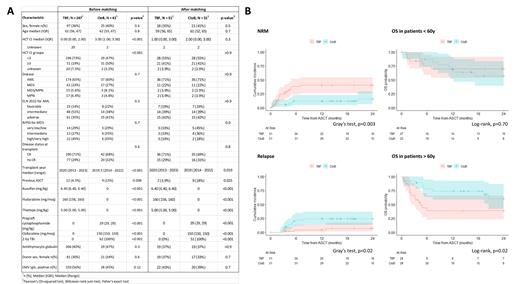Background:
Haploidentical transplantation (haploT) has become a routine practice in many centers but the optimal conditioning regimen has yet to be determined. Indeed, the historic Baltimore reduced intensity conditioning (RIC) regimen has been associated with poor outcomes in myeloid malignancies. Two alternative RIC regimens have recently demonstrated promising results in this setting. One of them replaces fludarabine with second-generation nucleoside analogue clofarabine (Clo-Baltimore regimen [CloB], Chevallier et al., Oncotarget 2018) and the other combines thiotepa-busulfan-fludarabine (TBF, Duléry et al., BBMT 2019). Here we compared outcomes in order to determine if one of these two regimens was superior for the treatment of myeloid malignancies.
Methods:
This was a multicenter retrospective study conducted by the Francophone Society of Bone Marrow Transplantation and Cellular Therapy (SFGM-TC). All consecutive adults having received a haploT after a CloB or a TBF RIC regimen for a myeloid malignancy between September 2013 and May 2023 were eligible. Patients data were extracted from the PROMISE database. CloB consisted of clofarabine 30 mg/m²/day (d) 5 d, cyclophosphamide (Cy) 14.5mg/kg/d 2 d, and 2-Gy TBI on d-2. TBF consisted of thiotepa 5mg/kg 1 d, busulfan 3.2 mg/kg 2 d, a fludarabine total dose of 120 to 150 mg/m². Graft-versus-host disease (GVHD) prophylaxis consisted of post-transplant Cy (2 doses of 50mg/kg), followed by cyclosporine A and mycophenolate mofetil starting on d+5. Some patients received antithymocyte globulin (ATG) 2.5mg/kg/d on d-2. Graft source was exclusively peripheral blood stem cells (PBSC).
To minimize bias between the CloB and the TBF groups, a propensity score matching (PSM) was constructed using a logistic regression model that included age, donor and recipient sex, hematopoietic cell transplantation-specific comorbidity index (HCT-CI), disease, cytogenetic risk (European LeukemiaNet [ELN] 2022), previous transplant, use of ATG, and cytomegalovirus (CMV) status, with the nearest-neighbor algorithm, and strict matching of key factors. Matched groups were then compared for time to engraftment (absolute neutrophil count > 0.5 x 10 9/L) and platelet (PLT) recuperation (>50 x 10 9/L), overall survival (OS), progression-free survival (PFS), GVHD-free, progression-free survival (GRFS), non-relapse mortality (NRM), and incidences of relapse as well as acute and chronic GVHD.
Results:
A total of 329 patients from 25 centers were included, 267 (81%) receiving TBF and 62 (19%) CloB. After PSM, 51 patients remained in each group, with comparable baseline characteristics except for the proportion of previous allotransplants ( Table). Median age was 60 years, and median HCT-CI score was 2. Main diagnoses comprised acute myeloblastic leukemia (AML, n=72 [71%]), including 42% with adverse genetic risk, and myelodysplastic syndrome (MDS, n=22 [22%]), including 25% with high or very high Revised International Prognostic Scoring System (R-IPSS). Thirty-eight (37%) patients received ATG.
Time to engraftment was equivalent after both TBF and CloB (19 d vs 19.5 d, respectively, p=0.70), but TBF patients achieved PLT recuperation faster (27 d vs 31 d, p=0.03).
Median follow-up was 24 months. Two-year OS, PFS and GRFS were 55% vs 60% (p=0.19), 52% vs 60% (p=0.25), and 37% vs 50% (p=0.15) for TBF and CloB patients, respectively. No differences were observed in terms of grade 3-4 acute GVHD at 3 months (18 vs 20%, p=0.86) nor two-year extensive chronic GVHD (16% vs 8.3%, p=0.25). However, two-year NRM was significantly higher after TBF (41% vs 16%, p=0.003), while relapse incidence was lower (7.1% vs 24%, p=0.02, Figure). In multivariate analysis, CloB was associated with a lower risk of NRM (hazard ratio [HR] 0.31, 95%CI: 0.1-0.7, p=0.008) and a higher risk of relapse (HR 4.03, 95%CI: 1.2-13.9, p=0.03). Finally, in patients aged >60y, two-year OS was significantly lower for those receiving TBF conditioning (39% vs 61%, p=0.02, Figure) due to higher NRM (56% vs 23%, p=0.005).
Conclusions:
In this retrospective study, a TBF RIC regimen used for PBSC haploT in adults with myeloid malignancies appeared substantially more toxic than a CloB RIC regimen. However, its enhanced anti-leukemic effect suggests that it should be offered to younger patients with no comorbidities or to those with high-risk disease. Conversely, CloB should be proposed for older or frail patients.
Disclosures
Dulery:Kite Pharma / Gilead: Other: Registration fees for scientific meetings and travel accommodations ; Takeda: Honoraria; Novartis: Honoraria; DPC AP-HP: Research Funding; Philippe Foundation: Research Funding; Monahan Foundation: Research Funding; Servier Foundation: Research Funding; Arthur Sachs Scholarships: Research Funding; Ligue Nationale contre le Cancer: Research Funding. Loschi:AstraZeneca: Honoraria; BMS: Honoraria; Gilead: Honoraria; GSK: Honoraria; Jazz: Honoraria; Kartos: Honoraria; Medac: Honoraria; MSD: Honoraria; Novartis: Honoraria; Pfizer: Honoraria; Sanofi: Honoraria; Sobi: Honoraria; Telios: Honoraria; Alexion: Honoraria. Huynh:Medac: Other: Advisory board; Astellas: Other: Advisory board; Pfizer: Other: advisory board; Servier: Other: Advisory board; Jazz: Other: travel fees, advisory board; Novartis: Other: travel fees, advisory board; Neovii: Other: Advisory board. Devillier:Astellas: Honoraria; Incyte: Honoraria; Jazz Pharmaceuticals: Honoraria; Medac: Honoraria; Sanofi: Honoraria; MSD: Honoraria. Marchand:SERVIER: Consultancy, Honoraria; JAZZ PHARMACEUTICALS: Consultancy, Honoraria; SOBI: Consultancy; ASTELLAS: Consultancy. Forcade:Novartis: Consultancy, Other: Travel support, Speakers Bureau; Alexion: Other: Travel support, Speakers Bureau; Astellas: Speakers Bureau; Gilead Sciences: Other: Travel support, Speakers Bureau; GSK: Speakers Bureau; Sanofi: Speakers Bureau; MSD: Other: Travel support. Chalandon:Janssen: Other: travel support; Novartis: Honoraria, Other: travel support; Jazz: Honoraria, Other: travel support, Speakers Bureau; Astra-Zeneca: Honoraria, Other: travel support; Amgen: Honoraria, Other: travel support; Incyte: Honoraria, Other: travel support; Servier: Honoraria; BMS: Honoraria, Other: travel support; Abbvie: Honoraria, Other: travel support; Sanofi: Other: travel support; MSD: Honoraria, Other: travel support; Pfizer: Honoraria; Gilead: Honoraria, Other: travel support; Roche: Honoraria, Other: travel support. Beguin:Galapagos: Research Funding. Mohty:JAZZ PHARMACEUTICALS: Honoraria, Research Funding. Chevallier:Incyte: Honoraria, Research Funding; Sanofi: Honoraria; Mallinckrodt Pharmaceuticals: Honoraria; Takeda: Honoraria; Immedica Pharma: Honoraria; Servier: Honoraria.


This feature is available to Subscribers Only
Sign In or Create an Account Close Modal